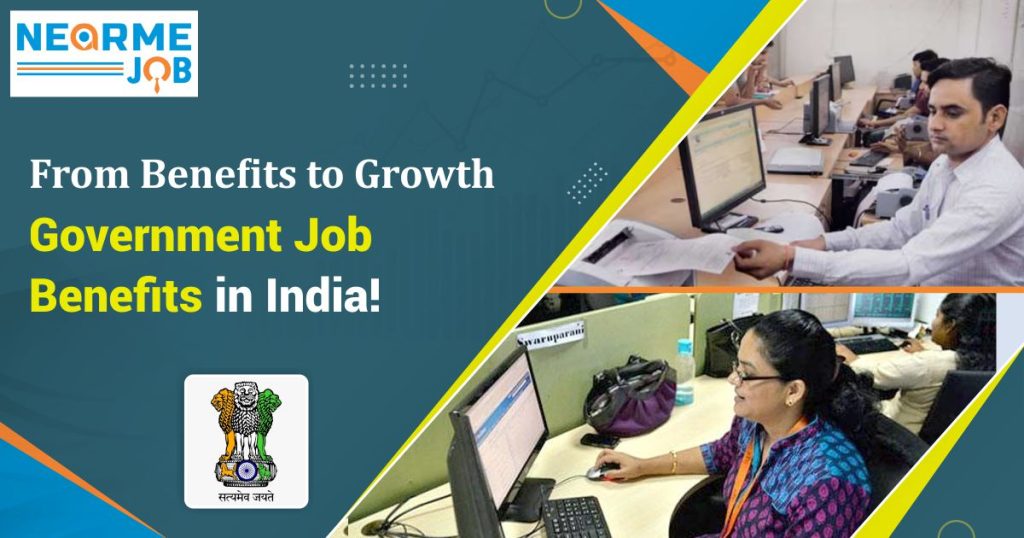When it comes to choosing a career, we often look for jobs that offer the best benefits and perks—healthcare, retirement plans, work-life balance, and more.
While the private sector is often glamorized for its high salaries and flashy perks, government jobs quietly offer a treasure trove of benefits that are hard to match.
Top Government job benefits in India

Many of us have grown up hearing our parents say, Get a government job in India, it’s secure and comes with lifelong benefits. But what exactly makes government jobs stand out?
In this article, we’ll break down the 14 key benefits of government jobs and compare them to private-sector perks to show why government jobs often have the edge.
1. Job Security & Stability:
Government Job Benefits: Layoffs are almost unheard of in government jobs. Even during economic downturns, public sector demand remains stable or even increases (e.g., healthcare, infrastructure, and education). Employees can focus on their work without worrying about sudden job loss.
Private Job Reality: Private-sector employees face constant uncertainty. Layoffs, restructuring, and downsizing are common, especially during recessions or company mergers.
Why Government Wins: Government jobs offer lifelong stability, while private-sector roles are often at the mercy of market fluctuations.
2. Salary & Allowances:
Government Job Benefits: Competitive salaries are complemented by allowances like Dearness Allowance (DA), House Rent Allowance (HRA), and travel reimbursements. Remote postings come with hardship allowances, turning challenging assignments into adventures.
Private Job Reality: While private-sector salaries can be higher, they often lack the additional allowances that government jobs provide. Bonuses are also tied to performance, which can be unpredictable.
Why Government Wins: Government jobs offer consistent, inflation-adjusted income with added perks that private-sector roles rarely match.
Example:
- An IAS officer in a rural district earns ₹1.5 lakh/month, but with allowances, take-home rivals a Mumbai corporate manager’s ₹2 lakh—without the rent stress.
3. Pension & Retirement Benefits:
Government Job Benefits: Government employees enjoy guaranteed pensions, often 50% of their last-drawn salary, along with health benefits and gratuity payments.
Private Job Reality: Most private-sector employees rely on 401(k) plans or EPF (Employee Provident Fund), which are subject to market risks. Pensions are rare.
Why Government Wins: Government jobs provide risk-free retirement plans, ensuring financial security even in old age.
4. Work-Life Balance:
Government Job Benefits: Fixed working hours (typically 9-to-5) and no overtime expectations. Weekends and holidays are strictly respected.
Private Job Reality: Private-sector employees often face long hours, weekend work, and constant pressure to meet deadlines. Work-life balance is often sacrificed for career growth.
Why Government Wins: Government jobs prioritize personal time, allowing employees to enjoy family life and hobbies without stress.
Example:
Strict 9-to-5 cultures and zero quiet overtime expectations. Miss a family dinner for work? Rare.
In South India, some offices close by 4:30 PM for daylight commutes. Weekends? Sacred. Compare this to the 62-hour workweeks common in Asian private sectors.
5. Promotions & Career Growth:
Government Job Benefits: Promotions are based on seniority and performance, with clear timelines and opportunities for advancement. Training programs are regularly offered to enhance skills.
Private Job Reality: Promotions in the private sector can be unpredictable and often depend on office politics or favouritism.
Why Government Wins: Government jobs offer transparent career growth without the guesswork.
Example:
Promotions follow time-bound frameworks (e.g., “7 years served + exam = upgrade”). No kissing up to bosses for raises. Want to leap ahead? Clear the Departmental Exams—merit meets opportunity.
6. Healthcare Benefits:
Government Job Benefits: Employees and their families enjoy cashless treatments at top hospitals, with coverage for everything from routine checkups to critical surgeries.
Private Job Reality: Private-sector health insurance often comes with high premiums, co-pays, and limited coverage.
Why Government Wins: Government jobs provide lifetime healthcare benefits without the financial burden.
Example:
- CGHS (Central Government Health Scheme): ₹500/year covers:
- Free treatments at top hospitals (AIIMS, Apollo).
- 75% reimbursement on critical surgeries.
- Coverage for parents, spouse, and children.
Read This Also ➡ Government Jobs vs Private Jobs: 10 Key Differences Explained
7. Housing & Accommodation:
Government Job Benefits: Subsidized housing in prime locations and low-interest home loans make owning a home affordable.
Private Job Reality: Private-sector employees often struggle with high rents and expensive mortgages, especially in urban areas.
Why Government Wins: Government jobs make homeownership achievable, even in expensive cities.
Example:
- Live in government colonies (Delhi’s Chanakyapuri, Mumbai’s Bandra) at 10% market rent.
- Want to buy? Home Loans at 6% interest (vs. 9% for others). For a Mumbai employee, this could mean a ₹2 crore flat for ₹1.4 crore—saving ₹60 lakh.
8. Educational Benefits for Children:
Government Job Benefits: Quotas in top schools and scholarships for higher education give employees’ children a significant advantage.
Private Job Reality: Private-sector employees often pay hefty fees for quality education, with no institutional support.
Why Government Wins: Government jobs invest in the next generation, easing the financial burden of education.
Example:
Kendriya Vidyalaya schools reserve 25% seats for government employees’ children, saving ₹1.5 lakh/year in private fees. Higher education? Central University quotas slash cutoffs by 10-15%.
9. Special Leaves & Holidays:
Government Job Benefits: Generous leave policies, including maternity leave, study leave, and even stress leave, ensure employees can handle life’s challenges without sacrificing their careers.
Private Job Reality: Private-sector leave policies are often limited, with strict caps on vacation and personal days.
Why Government Wins: Government jobs respect personal time and offer flexibility when life gets tough.
Example:
- Childcare Leave: 2 years (730 days) for mothers.
- Study Leave: 2 years paid hiatus for PhDs.
- Special Disability Leave: For mental health crises. Need 30 days for a parent’s surgery? No guilt-tripping HR.
10. Social Status & Respect:
Government Job Benefits: A government ID card commands respect and trust, opening doors to faster services and community influence.
Private Job Reality: Private-sector employees often lack the societal recognition that comes with government roles.
Why Government Wins: Government jobs offer social capital that private-sector roles can’t match.
Example:
- Priority services: Faster passport processing, VIP bank queues.
- Community influence: Local leaders seek your input. In India, the term “Sarkari Naukri” (government job) still opens marriage proposals.
11. Loan & Financial Benefits:
Government Job Benefits: Lower interest rates, waived collateral, and quick approvals make loans easily accessible.
Private Job Reality: Private-sector employees often face higher interest rates and stricter loan requirements.
Why Government Wins: Government jobs make financial planning easier and more affordable.
Example:
- Lower interest rates: Home loans at 6% vs. 9% for others.
- Collateral-free limits: ₹15 lakh personal loans without assets. Even credit cards waive income proofs—your job is your credit score.
12. Post-Retirement Opportunities:
Government Job Benefits: Retirees are often hired as consultants, trainers, or advisors, ensuring a steady income even after retirement.
Private Job Reality: Private-sector retirees often struggle to find meaningful post-retirement opportunities.
Why Government Wins: Government jobs offer lifelong career relevance.
Examples:
- PSUs (e.g., ONGC, SAIL) as consultants (₹1-2 lakh/month).
- NGOs seeking grant-writing prowess.
- Universities for policy lectures. Your Rolodex becomes a pension multiplier.
13. Special Benefits for Women:
Government Job Benefits: On-site creches, extended maternity leave, and strict anti-harassment policies support working mothers.
Private Job Reality: Private-sector policies for women are often less comprehensive and harder to access.
Why Government Wins: Government jobs empower women to balance career and family.
Example:
- Creches: On-site daycare (₹500/month vs. ₹15k private).
- 6:30 PM curfew: Offices in unsafe areas close early for women.
- Transfers: Spouse co-location guaranteed. Result? India’s central government has 14% female workforce vs. private sector’s 6%.
14. Travel & Transport Benefits:
Government Job Benefits: Official vehicles, relocation allowances, and subsidized airfare make transfers and travel hassle-free.
Private Job Reality: Private-sector employees often bear the cost of travel and relocation themselves.
Why Government Wins: Government jobs turn work assignments into adventures with minimal personal expense.
Example:
- LTC (Leave Travel Concession): Free airfare for family vacations every 4 years.
- Transfer allowances: ₹50k+ for moving cities + 30 days paid house-hunting. That Kerala-to-Ladakh transfer isn’t a hassle—it’s a subsidized gap year.
Government jobs aren’t about red tape, they’re about rewriting life’s equations.
Where else can you fight climate change by 5 PM, fund your child’s education from government funds, and retire to a second career—all while banks fight to loan you money?
The true perk isn’t the pay check; it’s designing a life where stability and adventure coexist.

















One thought on “From Benefits to Growth: Government Job Benefits in India”